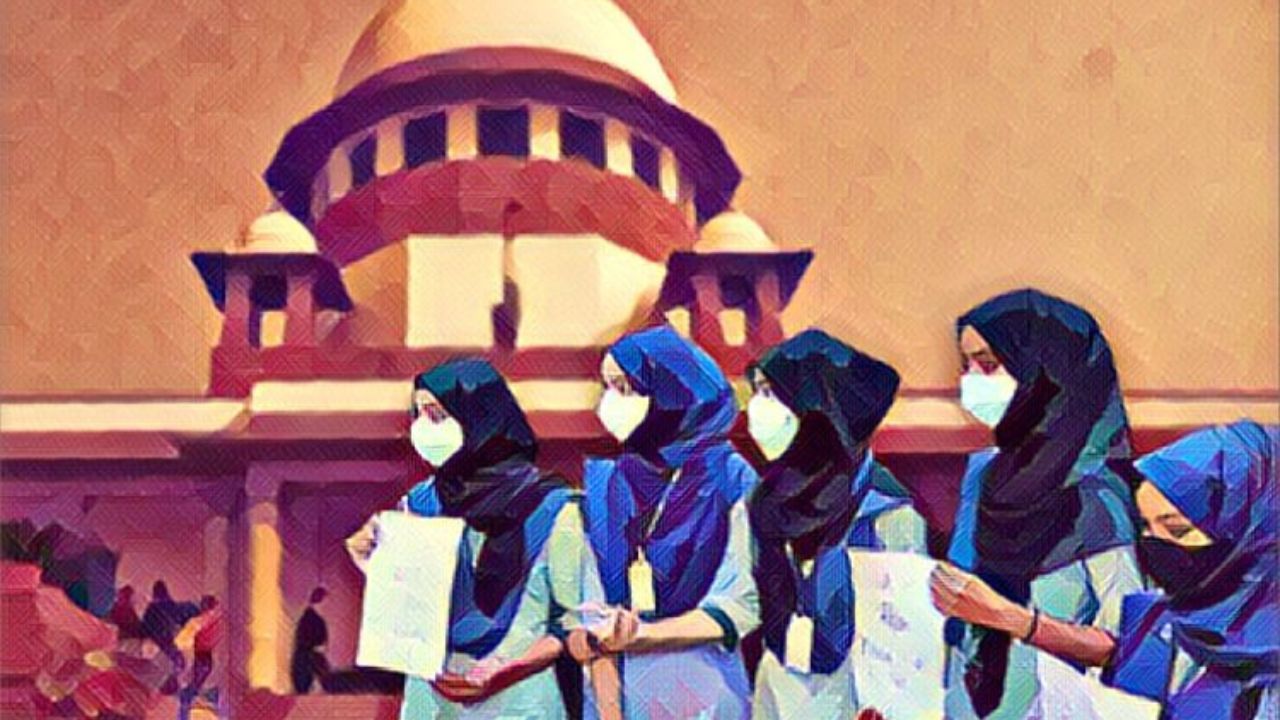In a Supreme Court hearing on the Karnataka Hijab ban case, Senior advocate Kapil Sibal on Thursday said that for Muslim women wearing hijab relates to the personal dignity and identity of the individual.
“Wearing of a Hijab is the expression of what you are, who you are, where are you from, Sibal said. Sibal said, questioning if the right to wear Hijab is available to a woman at a public place, is her right extinguished when she enters a school. “You cannot destroy me,” he added, “Hijab is now a part of the persona and also a part of the cultural tradition.”
The senior advocate also suggested that the matter should be referred to a Constitution bench.
On Thursday, the Apex Court heard arguments on a batch of pleas challenging the Karnataka High Court verdict, which upheld the ban on Hijab in educational institutions of the state.
A bench of Justices Hemant Gupta and Sudhanshu Dhulia heard submissions of several counsels, who appeared for the petitioners and argued on various aspects including the wearing of hijab being a matter of privacy, dignity and also autonomy, and whether the practice of wearing it is essential or not.
“The consequence of depriving young girls is depriving them of fundamental rights of access to education, privacy, dignity,” Sibal argued that hijab is also a cultural right protected under Article 29.
Citing the RTI reply obtained by Deccan Herald which revealed that 145 out of 900 Muslim girls in Dakshina Kannada took transfer certificates after the ban, he said, “And all the 900 Muslim girls may not be hijab wearing. So, if you take the percentage out of hijab-wearing girls, it is more.”
Justice Dhulia asked if the transfer certificates were taken after completion of class. The petitioner’s counsel said these girls stopped going to college even before the completion of class.
Appearing for one of the petitioners, Senior advocate Prashant Bhushan submitted before the Supreme Court bench that religious practice can be proscribed only if it is against the grounds of public order, health or morality and these three rights are absent in the case of hijab and hence it is discriminatory.
“It becomes discriminatory because you have only banned the hijab,” He said, questioning, “You have not banned other religious markers like pagdi for Sikhs, tilak for Hindus, cross for Christians. You have singled out hijab, which is a Muslim identity. If the rationale is to erase religious markers from school, then you have to proscribe all religious expressions.”
After hearing several batches of petitions made by other counsel, the top Court bench said, it is not the “interpreter” of the Holy Quran and it has been argued before it in the Karnataka Hijab ban matter that courts are not equipped to interpret religious scriptures.
“The one way is to interpret the Quran…We are not interpreters of the Quran. We cannot do it and that is the argument raised also that the courts are not equipped to interpret religious scriptures,” Justices Gupta and Dhulia said.
One of the advocates argued the way the Karnataka High Court interpreted the matter from an Islamic and religious perspective was a “wrong assessment”.
In response, the bench maintained, “The high court might have said anything, but now we are taking an independent view in the appeals.”
In the hijab case, Senior advocate Colin Gonsalves said the most important issue is whether the practice of wearing hijab is essential to religion or not and once the practice has been established, he contended that it is covered by Article 25 of the Constitution.
Article 25 of the Constitution deals with freedom of conscience and free profession, practice and propagation of religion.
Advocate Gonsalves argued the high court judgment is a verdict is the perception of the “majority community” and the minority point of view is seen “very partially and very wrongly”.
“It is basically a majoritarian judgment. The judgement read as a whole is basically from a majoritarian perspective point of view. It does not conform to the kind of constitutional independence that a judgement ought to have,” he said while arguing that the Supreme court should set aside the judgement on this ground alone.
“What is the difference? If you can wear a turban, why cannot you wear a Hijab? Gonsalves wondered, “The ‘dress’, ‘undress’ arguments in unfortunate because Muslim girls are in fact undressed if they are told to take off the Hijab by the security guard.”
While hearing the Hijab case recently, the Top Court had remarked if the right to dress would also mean a right to undress. Justice Gupta made the comments while responding to an argument that the right to dress forms part of the fundamental right to freedom of speech and expression.
Related
Rabia Shireen is a Staff Reporter at The Cognate.












































